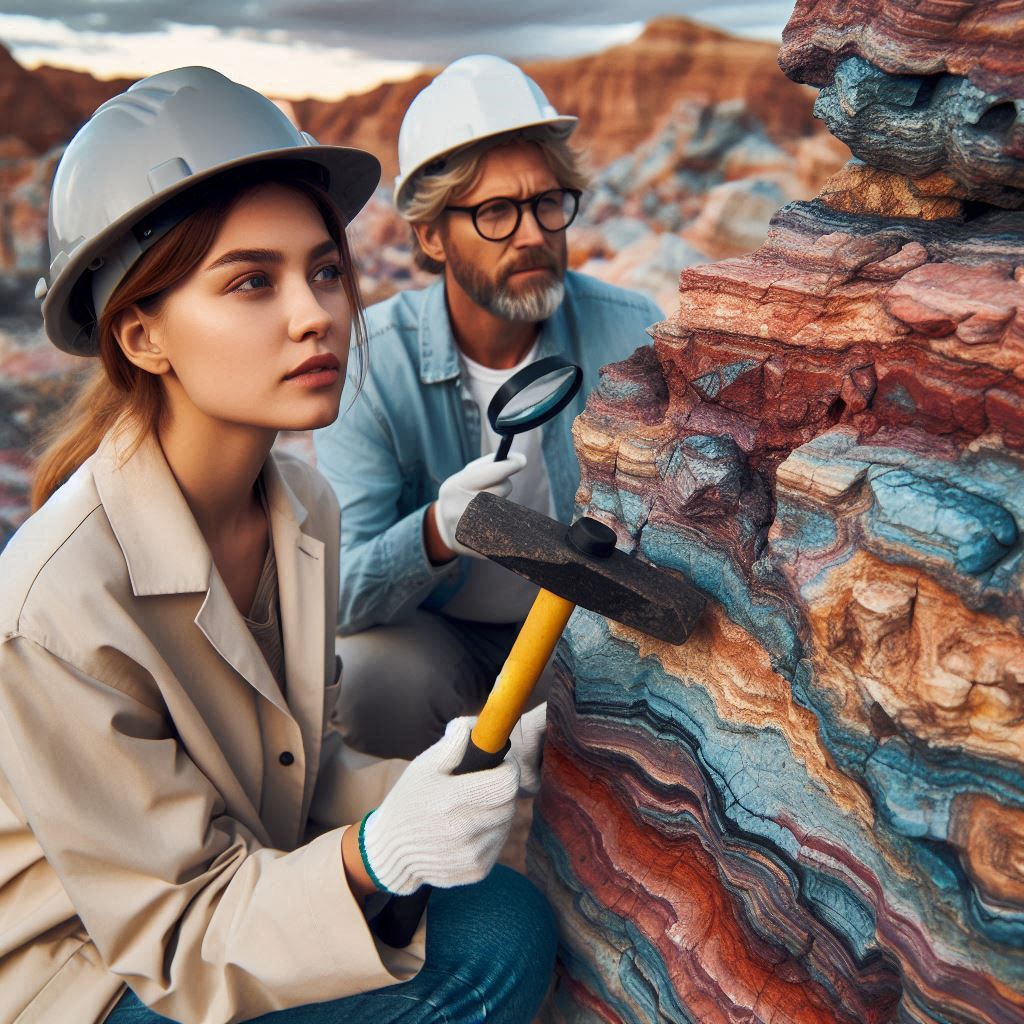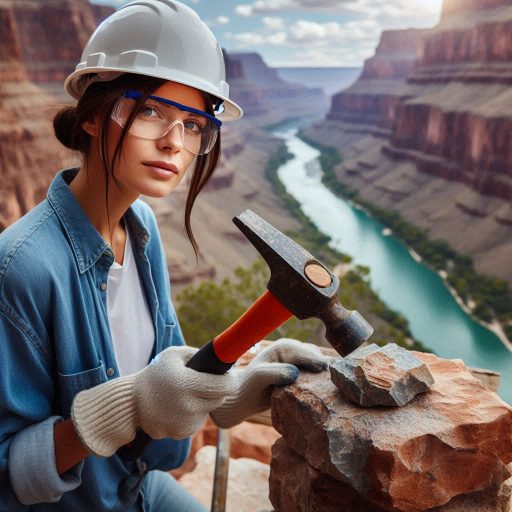Introduction
Field experience is crucial for geologists, offering hands-on learning that deepens understanding beyond textbooks.
Geology is a science built on observation, and fieldwork enables you to interpret natural processes firsthand.
Without this practical exposure, theoretical knowledge can feel abstract and disconnected from real-world applications.
By working directly in the field, you gain essential skills, such as rock identification, mapping, and sampling techniques.
These skills help you grasp how geological formations evolve over time.
Field experience also sharpens critical thinking and problem-solving abilities, as you’re required to analyze complex environments in real time.
Additionally, fieldwork provides valuable opportunities to collaborate with experienced geologists.
Learning from their insights improves your technical proficiency and professional network.
Engaging with different geological terrains also broadens your understanding of Earth’s diverse systems.
Beyond skill-building, practical experience enhances career prospects.
Employers often favor candidates with hands-on field experience, viewing them as better prepared for real-world challenges.
Lastly, fieldwork can spark a deeper passion for geology.
It allows you to witness Earth’s dynamic forces in action, fueling curiosity and ongoing learning.
Research
Types of Field Experiences in Geology
Internships
Geology internships are one of the most common ways to gain field experience.
Many organizations offer internships to students and recent graduates, providing hands-on experience in real-world geological settings.
Internships often involve fieldwork, data collection, and analysis.
They are usually offered by government agencies, environmental consulting firms, and research institutions.
Internships allow you to apply classroom knowledge in practical situations, network with professionals, and gain a clearer understanding of career paths in geology.
Field Camps
Field camps are intensive, immersive programs designed specifically for geology students.
Typically offered by universities, field camps take students into the field for weeks at a time.
These experiences often involve mapping geological formations, collecting rock samples, and learning field techniques.
Field camps provide students with hands-on training in geology, giving them an opportunity to apply their theoretical knowledge.
Additionally, they often take place in diverse geographic locations, offering a broad range of geological environments to study.
Volunteer Opportunities
Volunteer opportunities are another way to gain field experience in geology.
Many non-profit organizations, museums, and government projects seek volunteers to assist with fieldwork.
These opportunities can range from helping with geological surveys to contributing to conservation efforts.
Volunteering allows you to work on real-world projects, develop practical skills, and make meaningful contributions to geological research.
Although unpaid, these experiences can be invaluable for building your resume and expanding your network.
How to Research and Find Field Experience Opportunities
Use University Resources
Start your search for field experience opportunities by using your university‘s resources.
Many geology departments have connections with organizations that offer internships, field camps, and volunteer programs.
Faculty members often have industry connections and can provide recommendations or referrals.
Career services departments also frequently post available internships and volunteer positions.
Attend career fairs and speak with representatives from companies and organizations that hire geologists.
Check Professional Organizations
Many professional geology organizations offer job boards or networking events where field opportunities are posted.
Organizations like the Geological Society of America (GSA) and the American Geosciences Institute (AGI) frequently list internships, field camps, and volunteer opportunities.
Joining these organizations as a student member often gives you access to these listings and opens doors to networking events that can lead to fieldwork experiences.
Many online job boards list geology internships and volunteer positions.
Websites like Indeed, LinkedIn, and Glassdoor regularly post internships in geology.
Additionally, specific sites like Earthworks and GeoCorps focus exclusively on earth science jobs, including field positions.
Set up alerts for terms like “geology internship” or “geological fieldwork” to receive notifications when opportunities become available.
Network with Industry Professionals
Networking can help you discover fieldwork opportunities that aren‘t publicly advertised.
Attend geology conferences, workshops, and lectures to meet professionals in the field.
Use platforms like LinkedIn to connect with geology professionals and inquire about any upcoming opportunities.
Engaging with professionals can often lead to exclusive internships or volunteer positions.
Read: The Impact of Technology on the Chemist Profession in the US
Networking
The Importance of Networking in Geology
In the geology field, networking plays a crucial role in gaining field experience.
Networking connects you with industry professionals, professors, and peers who can provide hands-on learning opportunities.
Fieldwork is essential for geologists, as it gives practical skills that cannot be gained in a classroom.
However, finding those opportunities often requires the right connections.
By building a strong network, you open doors to potential field projects, internships, and mentorships.
Networking helps you stay updated on industry trends, conferences, and workshops where you can further your learning.
Geology professionals often share exclusive opportunities within their network.
These connections can significantly impact your career.
Ways to connect with professionals, professors, and peers for field experience opportunities
Attend Geology Conferences and Workshops
One of the best ways to connect with geology professionals is by attending industry conferences.
These events provide a platform to meet experts in your field and learn about current research.
Workshops and short courses at conferences often focus on field techniques, allowing you to sharpen your skills.
Networking at these events can help you stay informed about upcoming field projects.
Introduce yourself to speakers and participants, exchange contact details, and follow up after the event.
Building relationships at conferences can lead to future fieldwork opportunities.
Social media and online platforms offer easy access to professionals in the geology field.
LinkedIn, Twitter, and professional networks like ResearchGate allow you to connect with professors, researchers, and industry experts.
Following them on these platforms can give you insights into their projects, publications, and open positions.
Join geology groups and participate in discussions to expand your network.
Comment on posts, share relevant articles, and ask questions.
Professionals appreciate active engagement and may invite you to collaborate on projects.
Get Involved in Campus Geology Societies
Your university is a great place to start building connections.
Join geology societies or student section of professional organizations like the Geological Society of America.
These groups often organize field trips, workshops, and networking events where you can meet professors and industry professionals.
Volunteering to help with events can give you more face time with potential mentors.
Professors frequently receive information about fieldwork opportunities and internships.
By building relationships with them, you may gain access to these experiences.
Networking isn’t just about connecting with established professionals.
Your peers can also be valuable contacts in the field of geology.
Many geology students are involved in field projects or internships and may know of upcoming opportunities.
Work on collaborative projects with classmates to strengthen your relationships.
Share field experience leads, discuss job openings, and support each other in developing skills.
Peers can become future colleagues or even supervisors, so these connections are vital for long-term success.
In fact, networking is an essential part of gaining field experience in geology.
By actively building connections with professionals, professors, and peers, you can unlock valuable fieldwork opportunities.
Read: Essential Skills and Tools for Modern Chemists in America
Prepare
Necessary Skills and Knowledge for Field Experience in Geology
Fieldwork is an essential part of geology, offering practical exposure to real-world geological processes.
To succeed in the field, certain skills and knowledge are indispensable.
First, developing a strong understanding of basic geological principles is critical.
These include rock classification, mineral identification, and the interpretation of geologic maps.
Without these foundational skills, field observations and data collection can be challenging.
Another key skill is map reading and navigation.
Field geologists rely heavily on topographic maps, GPS devices, and compass readings to navigate unfamiliar terrain.
Understanding how to orient oneself in the field is vital for locating specific geological features and mapping them accurately.
A good grasp of geologic time is also crucial.
This helps field geologists interpret the relative ages of rock formations and other structures.
By understanding how layers were deposited and altered over time, geologists can reconstruct the history of an area.
Physical endurance is often overlooked but is equally important.
Fieldwork can involve long hikes, carrying equipment, and working in extreme conditions.
Strong physical fitness can make the difference between productive fieldwork and exhausting days.
Field communication skills are also necessary.
Geologists often work in teams, requiring clear communication for safety and effective collaboration.
Whether it’s conveying observations, discussing interpretations, or simply coordinating logistics, good communication ensures successful field operations.
Lastly, observation and recording skills are crucial for documenting field conditions.
Geologists must take accurate notes, draw detailed sketches, and photograph key features for later analysis.
Resources to Prepare for Geology Fieldwork
Preparing for geology fieldwork requires more than just classroom knowledge.
Fortunately, there are a variety of resources available to help build necessary skills.
Books, online courses, and hands-on workshops can all enhance your readiness.
Start with foundational texts like Geology in the Field by Robert Compton.
This book covers key field techniques, rock identification, and map reading, all essential for a successful field experience.
Another great read is The Field Geologist’s Manual by D.A. Berkman, which offers practical advice on everything from sampling to safety.
Online courses are another great option.
Platforms like Coursera and edX offer geology fieldwork courses.
Many of these are free and provide the flexibility to learn at your own pace.
For example, Stanford University offers a free online course on geologic time, a critical concept for field geology.
Hands-on practice is invaluable, so consider joining a local geology club or university field trip.
These groups often organize field excursions where you can gain real-world experience in a guided setting.
You can also participate in volunteer programs like Earthwatch, which often involve fieldwork in geology.
In summary, a mix of technical skills and physical preparation is key for geology fieldwork.
With the right resources, you can build the confidence and expertise necessary to thrive in the field.
Read: The Role of Chemists in US Environmental and Sustainability Efforts

Apply
How to Apply for Field Experience Opportunities
Gaining field experience in geology is essential for building practical knowledge and advancing your career.
To successfully apply for geology fieldwork, a strategic approach is necessary.
Start by researching the field experience programs available through universities, research institutions, or private organizations.
Focus on opportunities that match your specific interests within geology, such as environmental geology, paleontology, or mineral exploration.
Use online platforms like geology job boards, professional associations, and even social media networks to discover these opportunities.
Networking plays a crucial role in finding fieldwork opportunities.
Attend geology-related conferences, webinars, and local meetups to meet professionals in the field.
You can also network online through platforms like LinkedIn.
Making connections with your professors, classmates, and industry professionals can give you a competitive edge.
Often, geology opportunities aren‘t widely advertised, and recommendations or connections can open doors.
When you find a field experience opportunity, be sure to prepare your application thoroughly.
Customize your resume to focus on skills and experiences that are directly relevant to geology fieldwork.
Highlight any field experience, lab work, or courses you‘ve completed that demonstrate your technical abilities.
Specific skills like rock identification, GIS mapping, and soil sampling should be clearly listed.
Even if you lack direct field experience, mention any related work or activities, such as volunteering for environmental projects or participating in outdoor expeditions.
These show your comfort and adaptability in outdoor, often remote, settings.
Tips on Writing a Strong Resume and Cover Letter Specific to Geology Fieldwork
Writing a strong resume and cover letter is key to landing a geology fieldwork position.
Start by tailoring your resume for the specific fieldwork opportunity.
Emphasize relevant technical skills, such as the use of geological software, mapping, or surveying tools.
Keep your resume concise and well-organized, highlighting practical skills that would be useful in field settings.
Don‘t forget to include academic experiences, such as research projects or field trips that provided hands-on training in geological techniques.
A targeted cover letter is just as important as your resume.
Personalize each cover letter to the fieldwork program or company you‘re applying to, addressing why you are particularly interested in that opportunity.
Use the cover letter to show your passion for geology and your eagerness to gain hands-on experience.
Mention specific courses or projects that helped you develop the skills they are seeking.
Additionally, use the cover letter to demonstrate problem-solving abilities, especially since fieldwork often presents unexpected challenges.
You can describe situations where you adapted quickly or solved problems, even if these experiences aren‘t directly related to geology.
Once you‘ve applied, follow up with the organization to reiterate your interest and professionalism.
Following these tips will improve your chances of securing field experience and gaining valuable skills in geology.
Read: Day in the Life: An Environmental Scientist‘s Typical Day
You Might Also Like: Ethical Considerations in Neuroscience Studies
Gain Experience
What to Expect During Fieldwork in Geology
Fieldwork in geology is hands-on and challenging but highly rewarding.
You will likely work in rugged, remote areas.
Expect to spend long hours outside, often in unpredictable weather conditions.
Geologists frequently hike over difficult terrain, carrying essential tools like hammers, GPS units, and notebooks.
You‘ll also use specialized equipment to collect samples and record observations.
Teamwork is crucial during fieldwork.
Most fieldwork involves collaborating with others, whether classmates, colleagues, or supervisors.
Expect to communicate and share responsibilities to ensure safety and efficiency.
In addition, you’ll need to solve problems on the spot.
Equipment failures, weather changes, or unexpected geological features will test your adaptability.
Finally, expect to document everything meticulously.
Field notes are invaluable, as they serve as the foundation for future analysis.
Take detailed measurements and observations, and make sketches whenever possible.
Your field data should be organized and accurate since you will rely on it later for analysis.
Transform Your Career Today
Unlock a personalized career strategy that drives real results. Get tailored advice and a roadmap designed just for you.
Start NowMake the Most of Fieldwork
To make the most of your geology fieldwork, start by preparing thoroughly.
Before heading to the field, review the area‘s geological history and map.
Familiarize yourself with the type of rocks and formations you‘re likely to encounter.
This preparation will help you identify key features more efficiently.
Engage fully with the process.
While on-site, be curious and ask questions.
Engage with your field supervisors and peers to broaden your understanding.
Every location has unique geological aspects that can offer insight, so be open to learning from each feature you observe.
Take your field notes seriously.
Every observation you record can become crucial later in your analysis.
Keep your notes neat, organized, and detailed.
Sketching rock formations and noting their orientation will help you recall important details after you leave the site.
Learn from Every Experience
Fieldwork presents an invaluable opportunity to apply classroom knowledge in real-world settings.
Focus on connecting what you’ve learned to what you see in the field.
Make a conscious effort to understand how the theories and concepts apply in practice.
You should also reflect on your experience after each day in the field.
Reviewing your notes and comparing them to your initial expectations can help deepen your understanding.
Use this reflection to identify any gaps in your knowledge or skills, then work to fill them.
Finally, embrace the challenges of fieldwork.
It‘s normal to encounter difficulties, but these experiences teach resilience and problem-solving.
Adapting to tough situations will make you a more capable geologist in the long run.
Fieldwork is a critical part of a geologist‘s training.
By being well-prepared, fully engaged, and reflective, you can gain the most from each field experience.
Learn from every challenge, and use the opportunity to sharpen both your technical skills and your ability to think on your feet.
Reflect
The Importance of Reflecting on Field Experience
Gaining field experience in geology is crucial for professional growth.
However, reflecting on that experience is equally important.
Reflection allows geologists to assess what worked, what didn‘t, and how to improve.
When you take time to think about your experiences, you can identify the gaps in your knowledge or skills.
This self-awareness is essential for personal development and ensures continuous learning.
By reflecting on each field activity, you can connect theoretical concepts with real-world applications.
The insights gained through reflection ultimately enhance both problem-solving abilities and critical thinking.
In addition, reflection helps you consolidate your knowledge.
You can revisit specific details that might have gone unnoticed during the fieldwork.
This process reinforces your understanding of geologic formations, processes, and field methods.
Geologists who reflect are better prepared for future projects because they have a clearer grasp of past lessons.
Without reflection, much of the value of field experience is lost.
Reflection transforms observations into knowledge, and knowledge into improved field practices.
How to Document Field Experiences
Documenting field experiences is a powerful tool for growth.
Start by keeping a detailed field journal.
In your journal, record your observations, findings, and interpretations immediately after fieldwork.
This documentation ensures that you capture data while it is still fresh in your mind.
You should also note any challenges you encountered and how you overcame them.
Such records provide a valuable reference for future fieldwork, enabling you to avoid making the same mistakes.
Photographs and sketches are also critical to documenting field experiences.
Visual records help you revisit the site without being there physically.
By combining photos with written notes, you can create a comprehensive record of the geological features you encountered.
This practice sharpens your ability to observe and document details effectively.
In addition to journals and photos, digital tools such as apps for field data collection can make documentation more precise and accessible.
Analyzing Lessons for Growth and Improvement
Analyzing field experiences is key to turning them into growth opportunities.
Start by reviewing your field notes and reflecting on any surprises or challenges.
Consider what you could have done differently in your approach or technique.
Ask yourself if the tools or methods you used were effective or if you could have chosen better alternatives.
This kind of critical analysis leads to improved decision-making in the future.
Next, compare your interpretations with those of others.
Collaboration with colleagues can provide different perspectives, which can sharpen your analytical skills.
You can also learn by reviewing published research on similar field sites.
This comparison deepens your understanding of geologic processes and enriches your knowledge.
Documenting and analyzing field experiences can accelerate your growth as a geologist.
Each field activity becomes a learning opportunity, contributing to your long-term success.
Gain More Insights: Most Common Tools and Equipment for Biomedical Engineers
Find Out More: Microbiologist’s Role in Environmental Science
Conclusion
Gaining field experience in geology is crucial for understanding the Earth‘s dynamic processes firsthand.
Fieldwork offers practical insights that no textbook or classroom can replicate.
It allows you to observe rock formations, identify minerals, and interpret geological features in real-time.
By immersing yourself in diverse environments, you develop critical thinking and problem-solving skills essential to the profession.
Field experience also enhances your ability to apply theoretical knowledge to real-world scenarios.
Employers value candidates with hands-on experience, making it a vital component of a successful geology career.
You can‘t fully appreciate geologic phenomena without seeing them in their natural setting.
To gain this experience, actively seek opportunities such as internships, field courses, or volunteering on research projects.
Network with professionals and join geology clubs or organizations that offer field trips.
If you‘re still in school, enroll in field-based classes or participate in study-abroad programs.
Don‘t wait for opportunities to come to you‘create them.
Reach out to local universities, geological surveys, or environmental firms to inquire about fieldwork options.
The more exposure you gain, the stronger your skills will become.
Start now, and build a foundation of practical knowledge that will propel your career forward.




